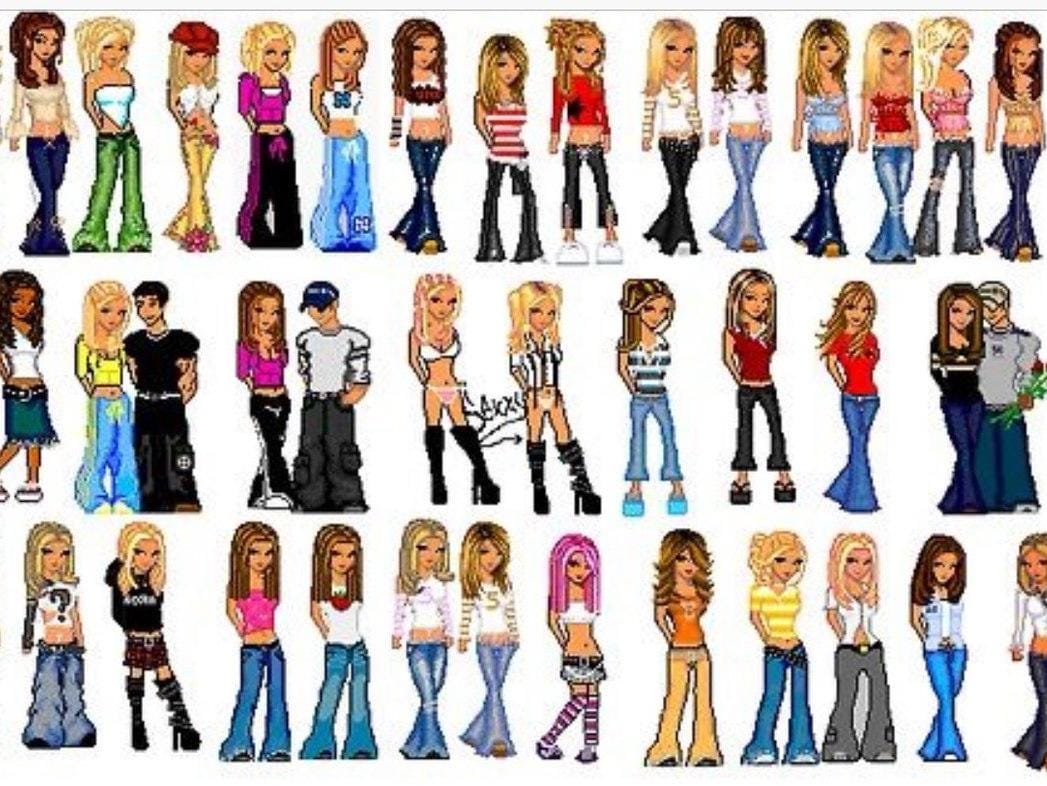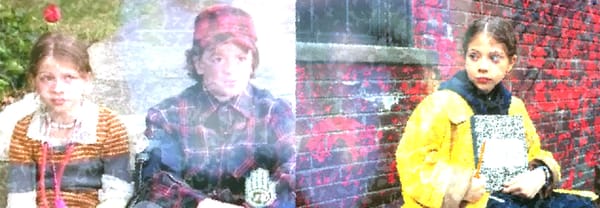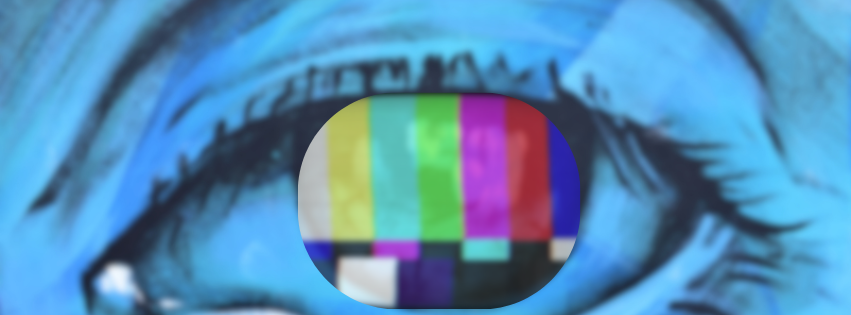The "Old" Internet
Reminiscing about the internet of yore and what it taught us about ourselves.

Musings of an Anxious Millennial Writer #06: Looking back fondly on the internet of yore.
Here’s a lament you’ll hear many millennials refrain: “I miss the old internet.” Once you’ve finally moved on from the “here are all the Nickelodeon shows I used to watch…” conversation (and I pray you have), it’s the second level of self-indulgent conversation in which people around my age partake.
But there’s a reason for it. It was formative. The “old” internet was where many of us cut our teeth. It was where we “posted through it” before that became a cultural phenomenon. It both humbled and emboldened us. And with it, we grew from children making Dollz Mania recreations of their BFFs to post on our AOL homepages to teens who would eventually turn into adults quoting Strongbad and Don Hertzfeldt’s rejected cartoons like war vets having ‘nam flashbacks.
We were unabashedly posting. We were free… until we weren’t
A prompt on Twitter a few months ago brought back a flood of memories of my digital yesteryear. The sacred tradition of booting up the 1,000-lb modem, making sure no one else was on the phone, then that screeching sound, those many moments of doubt—and then—finally—sweet release… the World Wide Web, right at our fingertips… for like an hour if we were lucky. With this newfound power came great responsibility. And yet, as a surprise to no one, we played fast and loose with the rules.
Don’t you dare go into one of those chatrooms; that’s where the real sickos are.
At least, that’s what we were told in numerous assemblies at school. Creeps pulling up in unmarked vans were passe; their cover had been lifted. Weirdos had to get inventive if they wanted to cause trouble now. They had to go digital. The World Wide Web was a scary place—even its safe havens, like Neopets or Club Penguin, could be ground zero for pests and predators. Nighttime news specials made everyone aware of what a chatroom looked like, so any helicopter parents could see immediately what was happening if their kid wasn’t quick enough on that minimize option (or didn’t practice the art of making sure the cursor was always hovering over it, just in case). But where there’s a will, there’s a way. Chatrooms with strangers were prohibited… but message boards were fair game.
It started innocently enough, Mandy Moore may not have enjoyed as many #1 TRL hits as her fellow pop starlets, but she won my heart.
I immediately sought out everything she did. And when A Walk to Remember came out, I raced (aka waited for my mom to get home from work and for us to finish dinner) over to Suncoast to grab a copy to watch on our newfangled DVD player. In terms of genre, it was my least favorite kind, but I allowed myself to watch the romance between a sweeter-than-candy (see what I did there?) farm girl with a terminal illness and a bad boy with a heart of gold. It was a shlocky sobfest, but man, if I didn’t love it—ok, maybe I didn’t love the movie as much as I loved Shane West. Either way, I ravenously read every review—and then, naturally, message board fan fiction—of the movie itself and the pairing of West and Moore.
While lurking on one of these particular boards, I made my first online friend. I couldn’t tell you much about her, I don’t remember her name (real or AIM screen name), but we’d chat online via IM occasionally. It was all so innocent enough, mostly just updates about our days and our mutual love of Shane and Mandy, but things turned one night (#Shandy would have been an appropriate portmanteau that I have, sadly, only just thought of now). My mom and grandma were working nights, so it was just my grandpa and me in our small apartment, which meant I had slightly more internet time than most nights. I made my usual rounds: check out the Mandy Moore message board, the Shane West message board, see if any of my friends were online, when I got an IM alert: it was my cool new internet friend, and she was bored, too!
Not as bored as me, it would turn out. Her life outside the message boards was much more active than mine, as she then sent me an email with a very in-depth review of her first sexual encounter (in a hot tub, no less). I was mortified and thought reading something like that was akin to viewing pornography. I didn’t know what to say, so I had no response. She asked me if I was Christian, to which I replied yes, and then she said, “oh, that makes sense,” and I never heard from her again.

Readers, it wasn’t my strong Christian values that made me afraid to interact with her email. It’s because I thought the internet police would think I was doing something bad and come tell my mom.
This fear would always follow me for years, despite my interludes on websites like the Cringe Humor message board and my forays into reading steamier and steamier fan fiction. It finally came to a head, however, when I did, in fact, download some virus onto my computer that made it immediately start playing porn whenever I’d turn it on (I shit you not, this was a thing that could happen outside of edgy college parody movies). And how did I get that, you ask?

I refuse to elaborate any further. Nor will we get into the IMing Dane Cook saga that brought my teenage self immeasurable joy, as I’d imagine our future together (it turns out that had I played my cards right, this idea might not have been as out of the realm of possibility as it seen—yikes!).
And because I’ve mentioned it enough, the epic highs and lows that came with chatting via AIM. These feelings would carry all the way over into the Myspace age. Suddenly all the words you couldn’t find in person seemed so easy when faced with the barrier of a computer screen. I could be the funny, witty person only my closest friends knew. I could muster up the courage to… ask my friend to ask my crush if he liked me back. I could read the words “no” instead of hearing them, so I could still pretend there was a chance. This veil the screen created allowed us to create avatars and alter how we presented ourselves to others. It allowed us to build up armor around ourselves. We were truly keyboard warriors using our fingers and 100 x 100-pixel squares to hide behind, guarding our hearts and better judgment. It was a trial by fire that we haphazardly barreled into, only learning things the hard way. An army of 12-14-year-olds who simply did not know any better.
I never dabbled with too many “bad” websites, your Something Awfuls, Rotten.com’s and their ilk. The hottest water I ever got into was from my reflections on life, the same things that led me down the path in life I’d continue to this very day, this very moment.
I got in trouble because of DeadJournal.
It was my fault; despite my lurking on friends’ and acquaintances’ pages, I didn’t think a journal could go that public. I said mean things about my peers as any angsty 13-year-old would in their private diary. It was like that excruciating scene in Harriet the Spy come to life, but instead of my classmates reading my innermost thoughts aloud, I was called into the principal’s office on Halloween, where I sat with my friends accused of the same crimes, as we were scolded by a woman dressed as the Statue of Liberty. And it wasn’t punishment just for saying crude things, but for being on a site that encouraged violence, foul language, and… gasp, pornography.
That last one felt like a stretch, but her tactic worked. I was petrified. I couldn’t keep it to myself. I had to tell my mom before the principal called (she wouldn’t). I had to pull up mine and my friends’ DeadJournals so my mother and grandmother could read them. It was brutal. It was my nightmare come to life.
It was a necessary step in my development that I wish every internet user had to experience.
There’s something about being faced with the mean or misguided things you’ve written and read back to you. About seeing the people you wish to disappoint the least upset by what you’ve said. That moment shattered the illusion of the computer screen as a shield. Real people were on both sides and could be hurt, just like cruel words said IRL.
I won’t say I showed up perfectly online from that moment on, I’d still have vague posts on Facebook and subtweets on Twitter well into my college years that still make me cringe, but I continued to learn more and more about online etiquette. The things acceptable in the comforts of unhinged message boards with other folks creating avatars of themselves are not appropriate in everyday internet life. Just as you wouldn’t want your parents or teachers to read your innermost, worst thoughts, nor should you want colleagues, employers, literally the entire fucking world with online access to, either.
And yet, even with the maybe-kind of probable-but-who-actually-knows downfall of Twitter, we’re repeatedly seeing people making these mistakes on the grandest of scales. We’re watching grown-ass adults make the mistakes we made when we were naive pre-teens, but this time for the entire world to see. It’s sad when it happens to folks with a lot to lose but not much to cushion their falls from grace. It’s downright scary when it’s people in power who will never face enough repercussions to alter their comfortable lives. It’s more worrying that young audiences see these folks as mentors instead of buffoons.
Adults are no longer the ones eschewing and boogeyman-ing the World Wide Web. Instead, they’re unabashedly and publicly making mistakes, sometimes failing upwards in the process. The entire internet is one giant message board, and there aren’t enough moderators in the world to ban the trolls. Maybe a unified social media collapse is the reset we all need if we want to save humanity, lest we allow the metaverse to become our cold, dark reality.
Anyway, here’s booger worm.



